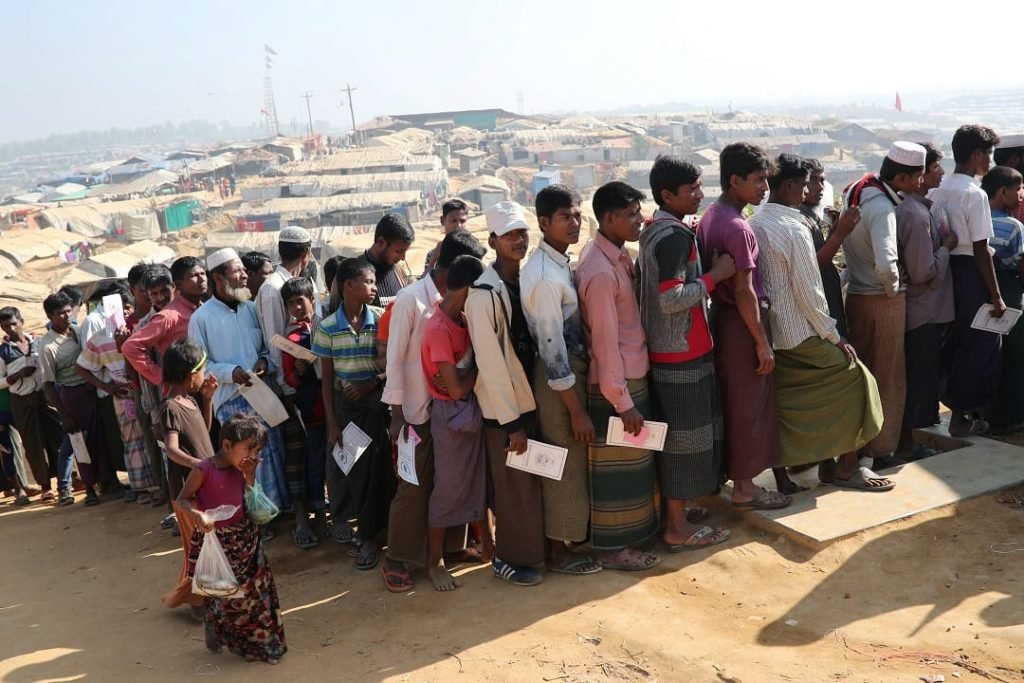By Maung Thein Myint (aka) Moshor Rof
Date: May 19, 2025
Overview
Myanmar has consistently refused to recognize the Rohingya. The Burma Citizenship Law of 1982, introduced after the military assumed power through a coup, privileged state-recognized ethnic groups but by excluding the Rohingya, denied them citizenship, effectively rendering them stateless. Their status remained unchanged even after the restoration of democracy. The 1982 law carry from the 1948 Citizenship Act which was also an exclusionary legislation particularly race as the basis of citizenship was derived from the 1948 Act. Segregated legislation, systemic barriers, and bureaucratic complexities have ensured that the Rohingya can’t become citizens.
Over 1.3 million of the predominately Rohingya Muslim live in Bangladesh as refugees from Myanmar. They include about 740,000 who fled a brutal counterinsurgency campaign in 2017 by Myanmar’s security forces, who were accused of committing mass rapes and killings. In recent weeks, the humanitarian situation for Rohingya civilians fleeing Bangladesh and around South Asia is severe escalated and dire resulted as several dead, many missing after boat in a sea journey. On other hand, The Arakan Army (AA) has been forcibly recruiting Rohingya youths to serve on the front lines in the conflict with the Myanmar military in the original region and there has been a significant increase in the number of Rohingya refugees fleeing to Bangladesh by crossing the Naf River, seeking safety from ongoing civil war, violence and persecution which is carry out by Arakan Army so called (AA) and Myanmar Junta Government. The Rohingya community in Arakan State, Myanmar, has faced a worsening humanitarian crisis marked by increased violence and repression, indicating ongoing military and AA operations targeting Rohingya civilians, resulting in killings, arbitrary arrests, and forced displacements in everyday life. Access to basic necessities, including food, healthcare, and shelter, has deteriorated significantly, exacerbating the dire living conditions as well in the region.
Following the extreme civil war in Arakan, approximately 114,500 Rohingya individuals have been fled the perilous journey to escape deteriorating conditions in refugee camps in Bangladesh. The situation for new arrivals of Rohingya civilians remains dire, primarily in Bangladesh, where many have sought refuge following persecution in Myanmar. The overcrowded refugee camps in Cox’s Bazar continue to struggle with inadequate resources, leading to concerns over health, Education, sanitation, and security, prompting many to flee in search of better living conditions to neighbor countries. Also there are unwanted hostiles among different arms groups in Rohingya Refugee Camps of Cox’s Bazar which led the severe violence, Killing, Force Conscription, Security Issues, and internally displaces in the community.
Current Situation Rohingya Refugee inside Myanmar and Bangladesh
Now, Arakan Army controlled 14 townships among 17 towns from Arkhan even though Bangladesh – Myanmar Border about 270 KM is also under the Arakan Army now. The forced displacement of Rohingya civilians by the Arakan Army (AA) and the Myanmar Junta has emerged as a critical humanitarian issue with profound implications for regional stability and human rights. The underlying causes, current dynamics, and consequences of these severe atrocities. The (AA) which has been accused of gross human rights violations, has played significant roles in exacerbating the displacement of Rohingya people by attacking across Rohingya in Maung Daw as well as the entire Arakan state, Myanmar.
The conflict between these groups and the Myanmar government has intensified, leading to widespread violence and persecution against Rohingya as 2nd Wave Genocide in Arakan, have created a perilous and dire environment for Rohingya, forcing them to flee their homes and have to seek refuge in Bangladesh unofficially through Naf River, and also many of them going to Malaysia, Indonesia and Thailand by Motorboat through Bay of Bengal. While the boats carrying Rohingya people from Myanmar, many individual capsized in the Bay of Bangle and many of them are missing since August, 2024. Despite this hardest moment, the situation for Rohingya fleeing Bangladesh and around South Asia is severe escalated and dire resulted dead, many missing following a motorboat accident. In the report of UNHCR indicate, there were over 600 Rohingya Refugee displaced to Indonesia and Sri Lanka within a month through a unimaginable sea way where the risk of live is extreme high and caused 24 Rohingya death.
The situation in Rakhine State is rapidly deteriorating. As of now, 14 out of 17 cities are under the control of the Arakan Army (AA), which is actively contesting the remaining three: Sittwe, Kyaukpyu, and Manaung. Should fighting reach Sittwe, the administrative capital and home to a significant number of Rohingya, the risks of mass atrocities will increase substantially. Both the Myanmar military junta and the Arakan Army have a documented history of targeting Rohingya civilians. This includes recent and ongoing cases of;
- Killings and abductions
- Forced displacement
- Destruction of Rohingya homes and property
Although the Arakan Army has publicly claimed support for Rohingya repatriation, its actions in Maungdaw, Buthidaung, and Rathedaung contradict this narrative. Attacks on civilians continue even after the group has seized territorial control, raising grave concerns about the sincerity of its claims.
In the Bangladesh Refugee Camp, The trafficking of Rohingya children, women and girls is not just a tragedy; it is a damning indictment of the international community’s failure to protect one of the world’s most vulnerable populations. The findings of this report are a stark reminder of the urgency of this issue. The voices of trafficked women must not be drowned out by the broader noise of the Rohingya crisis. Their suffering deserves attention and their protection must become a priority. The suffering does not end once these women are trafficked.
Community Response to the Proposed Humanitarian Corridor
Amid the crisis, discussions have emerged around the establishment of a humanitarian corridor—an initiative reportedly being explored by the interim government of Bangladesh in cooperation with the United Nations. While details remain scarce, the Rohingya community in Cox’s Bazar has reacted with cautious optimism. Many see this corridor as a possible:
- First step toward voluntary, safe, and dignified repatriation
- Pathway to establishing internationally-monitored safe zones in Rakhine
- Opportunity for citizenship restoration, justice, and reintegration
The corridor, if properly planned and implemented, could symbolize a turning point in Rohingya history. However, the community emphasizes that return must not be symbolic or superficial, but built on the restoration of rights, dignity, and long-term protection.
Recommendations and Expectations for the Humanitarian Corridor
Active Role of Bangladesh
The Government of Bangladesh must assume a strategic and proactive leadership role in shaping the humanitarian corridor. Given its central role in hosting the refugee population, Bangladesh’s involvement is crucial to ensuring accountability and effective implementation.
Rights-Based Approach
The corridor must go beyond logistics and be rooted in the Rohingya’s right to return, which includes:
- Legal recognition and citizenship
- Freedom of movement
- Access to health, education, and livelihood
- Land restitution and property rights
- Protection from persecution
- Any humanitarian initiative lacking these elements risks repeating the very injustices that led to mass displacement.
Call for Action
We urge individuals, organizations, and governments to support ongoing humanitarian efforts to provide safe lives, food, medical healthcare, livelihoods support that can make a significant progress in the lives of this vulnerable community. And also, requesting to Bangladesh authorities to take immediate actions to cleansing of Arms movement around the Rohingya Refugee Camps. These responses aim to address the immediate necessities and also considering long-terms Peace and support for the Rohingya particularly in camp.
The report highlights the harrowing experiences of survivors, who recount abuse, deprivation and the constant fear of being caught by authorities. Their statelessness compounds their vulnerability; without legal recognition, they cannot seek justice or protection, making them easy targets for traffickers and abusers. It highlights the need for better monitoring of trafficking networks, improved protections for Rohingya refugees and more robust efforts to dismantle the systems that enable trafficking to thrive. Addressing the root causes of this crisis requires a multifaceted approach. Refugee camps must be better equipped to provide education, economic opportunities and security for women and girls. Regional cooperation is essential to combat cross-border trafficking and survivors must be given the support they need to rebuild their lives.
The humanitarian response to this crisis has been challenged by the complexities of the conflict and the restricted access to affected areas. The urgent coordinated international efforts are needed to address the immediate needs for displaced populations and the underlying causes of this conflict. Recommendations include increased humanitarian aid, diplomatic interventions, and long-term strategies to promote peace and stability in Arakan. By understanding the multifaceted nature of the forced displacement, this paper aims to contribute to more effective solutions and policies that uphold human rights and support the affected communities.
Despite years of displacement, the Rohingya people remain steadfast in their desire for a safe, voluntary, and dignified return to their ancestral homeland in Arakan (Rakhine State), Myanmar. They do not wish to remain refugees indefinitely or face repeated cycles of violence and displacement. The Rohingya people remain hopeful but vigilant. The humanitarian corridor presents a potential pathway to return, but its success will depend on meaningful consultation, inclusive participation, and genuine political will. For the Rohingya, this is not merely a matter of repatriation—it is a matter of reclaiming identity, restoring justice, and securing the right to live in peace and dignity in their ancestral homeland.
Stay Informed
For ongoing updates and ways to help, subscribe to our newsletter and follow our social media channels. Your support is crucial in making a positive impact on the lives of Rohingya civilians around South East Asia and seeking refuge in Rohingya Refugee Camp, Cox’s Bazar, Bangladesh. Please Contact us (www.crric.org/ info@crric.org) for more information, please reach out to our office at [contact information]. Together, we can work towards a brighter future for those in need.



